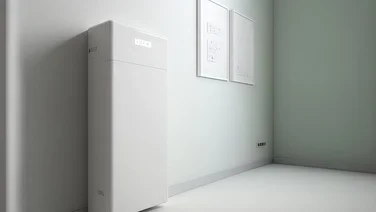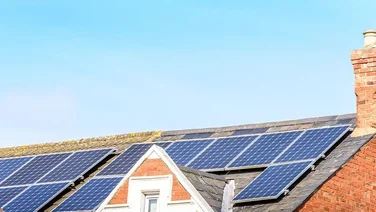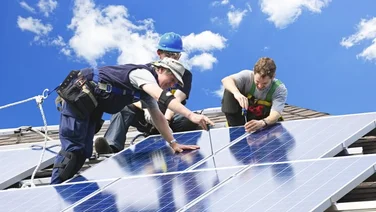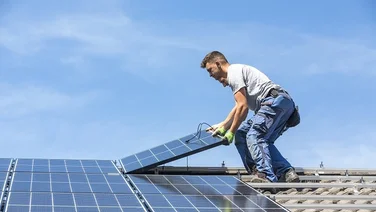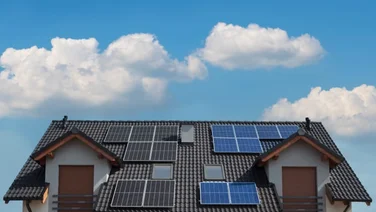We receive a small fee from trusted installers when you request a quote through our site. This helps us keep our content independent, well-researched and up to date – Learn more
- Black solar panels are more efficient, powerful, and heat resistant than others
- They’ll cut your electricity bills by more than blue solar panels
- But black solar panels cost more than other types
Black solar panels, otherwise known as monocrystalline panels, are the most common model on the market today. They are just one of many types of solar panels available on the market.
Despite being the most efficient product on the market, these solar panels cost more than other options, on average.
In this guide, we’ll explain why you can increasingly see them replace blue solar panels on roofs all over the country, and explore whether they’re the right choice for your home.
If you’re ready to start benefiting from solar energy, you can easily compare solar panel prices with our help. Just provide a few quick details, and our expert installers will be in touch with free quotes for you to compare.
Where do you want to install solar panels?
Get started
Why are solar panels black?
Solar panels are black because they’re monocrystalline, meaning each of their cells is made with just one silicon crystal.
The way light reflects off monocrystalline panels makes them look black, unlike polycrystalline panels, which we see as blue because they have multiple crystals per cell.
Both are natural silicon colours – though solar companies also intensify these colours during the manufacturing process.
They add anti-reflective coating that removes the grey undertones from these panels, giving monocrystalline a darker shade of black, and polycrystalline a brighter shade of blue.
Are black solar panels any good?
Black solar panels are the best type of solar panel available on the market at the moment.
They’ve won the race with blue solar panels, as well as thin film models and all the other kinds of solar panels, and now dominate the UK’s solar panel industry – as well as the country’s roofs.
Every single one of our best solar panels this year was black – and that trend is likely to continue for the foreseeable future.
If you can afford them, we would recommend getting black solar panels.
Efficiency
All of our most efficient solar panels were black solar panels, as monocrystalline is more efficient than polycrystalline.
Black solar panels usually have an efficiency rating of 18-23%, whereas blue solar panels are typically 13-16% efficient, and thin film models only hit 7-13% efficiency.
That’s a big difference, and a big advantage of choosing black solar panels over other kinds.
Monocrystalline panels are more efficient because they’re made from one block of high-grade silicon that’s had its impurities removed, and is therefore better at turning sunlight into energy.
Heat resistance
Black solar panels have a higher heat resistance than blue solar panels.
This means that when the thermostat goes above 25°C – as it regularly does now during British summers – monocrystalline solar panels’ power output are affected less than their polycrystalline counterparts.
As the UK gets hotter with each passing year, this feather in the cap of black solar panels becomes increasingly important.
Power
Black solar panels are typically the most powerful solar panels.
This isn’t due to any natural advantage, but is simply a result of monocrystalline panels being better in every other area.
Because of this fact, manufacturers are more likely to make black solar panels when they’re rolling out their new, cutting-edge designs with higher power ratings.
Where do you want to install solar panels?
Get startedPros and cons of black solar panels
Black solar panels are the best type of panel in most ways – but not all.
Here’s a pros and cons table to clearly explain all the reasons black solar panels do – and don’t – deserve a spot on your roof over other types of solar panel.
- Most efficient
- Most heat resistant
- Most powerful
- Highest savings
- Best product & performance warranties
- Most expensive
Do black solar panels cost more?
Black solar panels typically cost more than other kinds of solar panels.
Monocrystalline panels cost £370 to £420 per m² on average, whereas polycrystalline panels usually cost £300-£350 per m².
This means a black solar panel system will cost around 20% more than an array with blue panels, on average.
If you want to find out more about pricing, read our page on solar panel costs.

Are black solar panels worth it?
Black solar panels are almost always worth the extra expense, because they’re typically more efficient, powerful, and heat resistant.
These factors combine to ensure black solar panels produce much more solar energy than other models from the same amount of sunlight.
The average three-bedroom house with 10 solar panels will break even less than halfway through the panels’ lifespan, whether they’re black or blue – but you’ll save more money with black solar panels.
Do solar panels have to be black?
Solar panels don’t have to be black.
They can be blue, because they’re polycrystalline panels, or they can be an even wider range of colours.
For instance, Italian firm Peimar sells monocrystalline solar panels in green and red, as well as in more traditional shades.
Peimar creates this effect by replacing the standard anti-reflective coating most companies use with a thin layer of coloured, anti-reflective glass.
Summary
You now have all the information you need to make a decision about getting black solar panels.
The next step is to get quotes for your own panels.
Just provide a few quick details about your property, and we’ll put you in touch with our expert solar suppliers, who will provide you with quotes to compare.
FAQs
Do black solar panels reflect light?
Black solar panels reflect as little as 0.3% of the light that hits them, and absorb as much as 99.7%.
They absorb more light than any other type of solar panel, thanks to their dark colour.
Black solar panels can still only turn around 23% of this light into energy, but that number is increasing – and it’s the best efficiency rate on the market at the moment.
Do solar panels cause glare for neighbours?
Solar panels do cause glare for neighbours, for the short amount of time each day that your array’s angle and their property line up.
However, solar panels are covered in anti-reflective coating that limits glare, so the effect won’t be too extreme.
And since windows reflect light all the time – and no-one would ask a neighbour to get rid of their windows – you usually won’t receive any complaints.
Black solar panels cause the least glare for neighbours, as they reflect the least amount of light of any solar panel.
What is the best colour for solar panels?
Black is the best colour for solar panels, as it absorbs the most sunlight of any panel.
Black solar panels are also the most efficient, powerful, and heat resistant panels on the market right now.
Plus they usually come with the best product and performance warranties, as companies feel safe to back them for longer than other types of solar panel.



